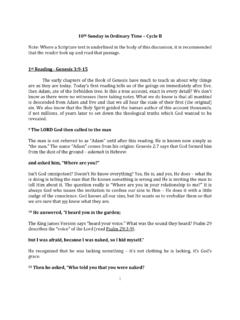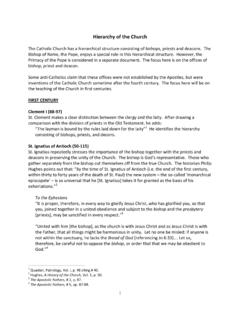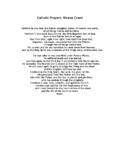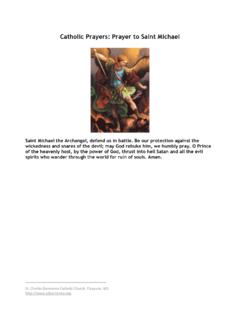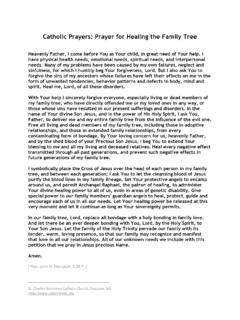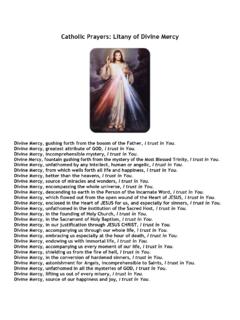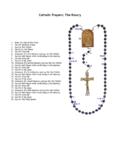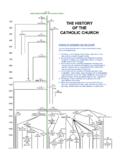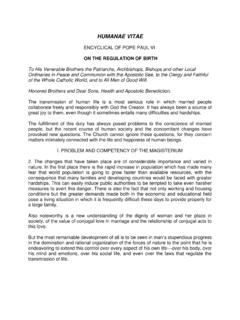Transcription of Solemnity of the Epiphany of the Lord - Charles Borromeo
1 1 Solemnity of the Epiphany of the Lord Note: Where a Scripture text is underlined in the body of this discussion, it is recommended that the reader look up and read that passage. Opening Prayer Holy and generous God, in your great love you have revealed yourself in creation. But you have done even more you have revealed yourself in your Son, our Lord Jesus. By believing in and following Him, we are led to eternal life with you. Help us not to be like King Herod, who, threatened by your revelation, tried to kill Jesus. Help us to be like the magi so that when we see your revelation, we will be filled with delight. We make our prayer in the name of Jesus the Christ, our Lord. Amen. Introduction Epiphany means revelation or manifestation.
2 Epiphany was originally an Eastern Church celebration. It was originally and primarily a celebration of baptism, the first Epiphany or manifestation. As the celebration moved westward, it took on the meaning of the revelation of Jesus to the Gentiles. The central point of this celebration is that God s salvation is intended not only for the people of Israel, but for all people. Epiphany is now celebrated as the 12th day of Christmas and its celebration seems to predate the celebration of Christmas itself. The Greek word Epiphany , meaning manifestation or appearance was used most often in ancient times to describe the king or ruler showing himself before the people of the nation. During Epiphany we see how God epiphanies Himself through Jesus.
3 It is the people of God empowered with the gifts of the Holy Spirit who reveal the risen Christ to the world through acts of creation, love, healing, and liberation. We of the Church are called to be an ever-unfolding Epiphany of God s love and power to the dark world seeking desperately for such epiphanies. The 12th night is a familiar title of a Shakespearian play and comes from European heritage where 12th night parish parties are (or were) celebrated. These parties have carried over into the Mardi Gras tradition. During the party, at the appointed time, the king cake is brought out. Hidden in the cake are three beans or coins. Those who find the prizes are crowned kings or queens for the evening.
4 While the royalty are being outfitted for their office, the Christmas tree is stripped of all ornaments (German Lutherans call this plundering the tree ). The tree is removed from the room and saved for the Lenten season when it is stripped of its branches and made into a processional cross. Tradition also celebrates the arrival of the wise men at this time. 1st Reading - Isaiah 60:1-6 2 Today s Old Testament reading is one of Isaiah s Songs of the First Return which are a lyrical description of the new Jerusalem as Israel is gathered from different places and restored. 1 Rise up in splendor! Your light has come, the glory of the Lord shines upon you. An extraordinary illumination, as though God were, by His presence in the city, radiating a dazzling light [see Deuteronomy 33:2, Malachi 4:1 (3:19 in NAB & NJB) where fiery love (the fire of judgment and refining) is described].
5 Like a sunrise, darkness immediately surrenders to the brilliant light, there is neither dawn nor dusk. [Verses 1-3 have been seen by some commentators as the source of Revelation 12]. 2 See, darkness covers the earth, and thick clouds cover the peoples; But upon you the LORD shines, and over you appears his glory. 3 Nations shall walk by your light, and kings by your shining radiance. 4 Raise your eyes and look about; they all gather and come to you: Your sons come from afar, and your daughters in the arms of their nurses. Literally, verse 4d reads your daughters are carried on the hips of their nurses. 5 Then you shall be radiant at what you see, your heart shall throb and overflow, For the riches of the sea shall be emptied out before you, the wealth of nations shall be brought to you.
6 6 Caravans of camels shall fill you, dromedaries from Midian and Ephah; All from Sheba shall come bearing gold and frankincense, and proclaiming the praises of the LORD. Those who are from Midian, Ephah, and Sheba are all descendants of Abraham (Genesis 25:1-4). God s chosen people who were scattered long ago now come to participate in their ancient inheritance promised by God s covenant with Abraham. One day all nations will become God s children (Romans 4:17; 8:16-17). 2nd Reading - Ephesians 3:2-3a, 5-6 Our second reading was written while Paul was in prison (verses 4:1; 6:20). Prisoner is a title of honor, a distinction that the preacher has gained for having borne witness to the truth.
7 It is the mark of a true apostle (2 Corinthians 11:23; 6:4-5; Luke 21:12). 2 [Y]ou have heard A possible indication that some readers did not know Paul directly 3 of the stewardship A ministry; not a task, but a realization of God s plan of God s grace that was given to me for your benefit, God s favor was shown to Paul not for himself but for others. 3 (namely, that) the mystery was made known to me by revelation. 5 [It] was not made known to human beings in other generations as it has now been revealed to his holy apostles and prophets by the Spirit, 6 that the Gentiles are coheirs, members of the same body, and copartners in the promise in Christ Jesus through the gospel. The Jews are God s chosen people, his family.
8 The Gentiles are now part of this family which forms the new Israel and shares in the inheritance (Romans 8:16-17). Gospel - Matthew 2:1-12 Today s Gospel reading has been called The Worship of the Magi . Matthew and Luke both have accounts of the conception and birth of Jesus and some of the incidents that followed the birth. Neither Mark nor John address this period in Jesus life. Matthew s version is greatly affected by the use of Old Testament texts. The magi seek a king, and Herod consults the religious experts of Judaism to find out where they should look. Of this there is no doubt, they should look not in Jerusalem, but in Bethlehem the city of David. 1 When Jesus was born in Bethlehem of Judea, in the days of King Herod, Four different Herods are mentioned in the New Testament.
9 The first is Herod the Great, referred to in this passage and the next; the second is his son, Herod Antiapas, who had John the Baptist beheaded (Matthew 14:1-12) and who abused our Lord during His Passion (Luke 23:7-11); the third, Herod Agrippa I, a nephew of Herod the Great, who executed the apostle James the Greater (Acts 12:1-3), imprisoned Peter (Acts 12:4-7), and died suddenly and mysteriously (Acts 12:20-23). The fourth, Herod Agrippa II, was Herod Agrippa I s son it was before him that Paul answered Jewish accusations when he was a prisoner in Caesarea (Acts 23:23). Herod the Great, who appears here, was the son of non-Jewish (Arab) parents. He came to power with the aid of and as a vassal of the Romans, particularly Marc Antony (see Josephus, Antiquities of the Jews 324-326).
10 He was a consummate politician and among other things he rebuilt the temple in Jerusalem on a lavish scale. Herod the Great had a persecution complex; everywhere he saw rivals to his throne. He was notorious for his cruelty: he killed over half of his 10 wives, some of his children, and many people of standing. He died in 4 BC. behold, magi 4 Wise men, astrologers. Originally the term designated the learned priestly caste of the Persians; later it came to mean anyone skilled in occult knowledge and power (magicians), or a charlatan or trickster. The word is not used in an abusive or derogatory sense here by Matthew and the mention of the star shows that they are wise men who study the stars (astrologers).
